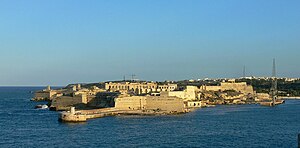Fort Ricasoli
| Fort Ricasoli | |
|---|---|
| Forti Rikażli | |
| Kalkara, Malta | |

View of Fort Ricasoli from Valletta
|
|

Map of Fort Ricasoli
|
|
| Coordinates | 35°53′51″N 14°31′33″E / 35.89750°N 14.52583°ECoordinates: 35°53′51″N 14°31′33″E / 35.89750°N 14.52583°E |
| Type | Bastioned fort |
| Area | 83,800 m2 (902,000 sq ft) |
| Height | up to 20 m (66 ft) |
| Site information | |
| Owner | Government of Malta |
| Controlled by | Malta Film Commission Waste Oils Co. Ltd. |
| Open to the public |
No |
| Condition | Mostly intact but dilapidated |
| Site history | |
| Built | 1670–1698 |
| Built by | Order of Saint John |
| In use | 1674–1964 |
| Materials | Limestone |
| Battles/wars |
French invasion of Malta (1798) Siege of Malta (1798–1800) World War II |
| Events | Froberg mutiny |
Fort Ricasoli (Maltese: Forti Rikażli) is a bastioned fort in Kalkara, Malta, which was built by the Order of Saint John between 1670 and 1698. The fort occupies a promontory known as Gallows' Point and the north shore of Rinella Bay, commanding the entrance to the Grand Harbour along with Fort Saint Elmo. It is the largest fort in Malta, and it has been on the tentative list of UNESCO World Heritage Sites since 1998, as part of the Knights' Fortifications around the Harbours of Malta.
Fort Ricasoli saw use during the French invasion of Malta in 1798 and the subsequent Maltese insurrection, after which it ended up in British hands. Ricasoli was the site of the Froberg mutiny in 1807, and it was also used as a military hospital during the 19th century. It saw use once again in World War II, when parts of it were destroyed by aerial bombardment. After it was decommissioned in the 1960s, the fort was used for industrial purposes. Today, the fort remains mostly intact but in a dilapidated state, and it is used as a filming location and a tank cleaning facility.
Fort Ricasoli stands on the easternmost peninsula on the east side of the Grand Harbour. The promontory was originally known as Rinella Point or Punta Sottile. In 1531, two leaders of a slave rebellion and ten others who took a prominent role, who had tried to take over Fort St. Angelo and escape from Malta, were tortured and then hanged on the peninsula, which became known as Gallows' Point (Maltese: Ponta tal-Forka) afterwards. During the Great Siege of Malta in 1565, the Ottomans built an artillery battery on the peninsula in order to bombard Fort St. Elmo.
...
Wikipedia
